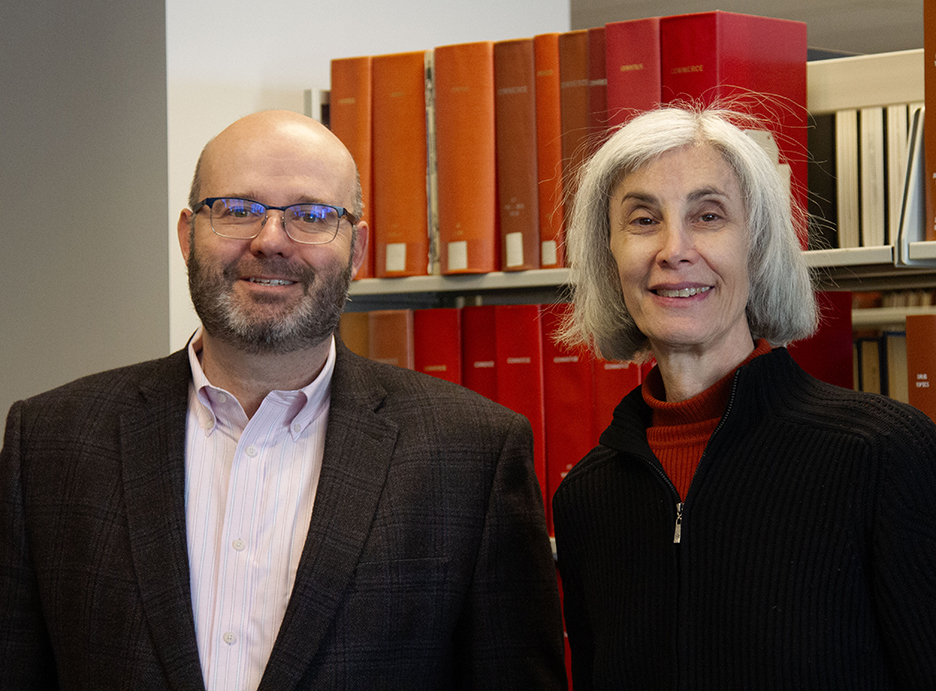
DePaul University's College of Law and Jarvis College of Computing and Digital Media (CDM) have collaborated to launch an innovative online
Certificate in Data Privacy & Cybersecurity Law. Originating from the work of Professors
Tony Volini (Law) and
Karen Heart (CDM), this certificate is specifically designed for professionals across legal, technology and other fields to better understand the crucial intersection between technology and law. Development of the certificate program was funded through DePaul’s
Academic Growth and Innovation Fund and involved Center for Intellectual Property Law & Information Technology Executive Director Ellen Gutiontov, Assistant Dean of Compliance & Communications Deborah LaGioia, and Associate Deans of Academic Affairs Allison Tirres and Max Helveston.
As legal practitioners and educators, Volini and Heart bring a wealth of experience in both law and information technology (IT). In 2020, they co-authored an
amicus brief to the U.S. Supreme Court on the Computer Fraud and Abuse Act, and as early as 2016, they recognized the need for an interdisciplinary approach to technology and law and began developing a curriculum integrating both perspectives. Since then, they have developed online lectures and worked to have courses cross-listed between the two colleges, with Volini focusing on privacy and Heart on cybersecurity and technology. The success of their approach led Bloomberg Law to recognize the College of Law’s
JD Certificate in Information Technology, Cybersecurity & Data Privacy as an
innovative program in 2023.
An Interdisciplinary Approach to Learning
Their hands-on, multidisciplinary approach garnered positive responses from DePaul students, inspiring the creation of the online certificate for professionals. The program is designed for professionals such as project managers in IT dealing with legal compliance or attorneys seeking a deeper understanding of technology. "To create great leaders in technology and law, we need to train them in both," Volini emphasizes.
Like the JD certificate, the strength the certificate program lies in its interdisciplinary faculty. DePaul’s unique combination of IT and law expertise offers professionals a deeper understanding of both fields. Students learn not just about legal recourse after a cybersecurity attack but also about the practical security measures that can prevent them. For instance, Volini, with an MS in Cybersecurity, can teach both the legal implications and technical mechanics of encryption, showing how different approaches achieve confidentiality and authentication.
The concepts taught in this certificate have significant real-world applications. For example, the CrowdStrike incident in July 2024, which affected millions of Windows systems globally, underscores the need for professionals who understand both the technological failures and the legal frameworks that apply. Heart advocates for a computer product liability subarea of law, pointing out the gap where software creators face no liability for damages caused by their products. The certificate aims to equip professionals to assess such situations comprehensively—from identifying what went wrong to navigating potential legal challenges.
Shaping Future Policy and Practice
Volini also highlights a critical gap in U.S. privacy law: "If there isn’t a specific law addressing a particular privacy issue, it’s generally considered permissible. Unlike Europe, which views privacy as a fundamental human right, the U.S. requires new laws to address privacy violations, and Congress has not enacted a broad privacy law in over 20 years."
The certificate not only prepares students for professional success but also serves as a foundation for broader societal change. “We can't teach everything,” Volini notes, “but by providing fundamental principles at the intersection of technology and law, we empower individuals to drive growth and transformation.” Heart echoes this sentiment, adding, “The more people who understand these concepts, the more we can influence public attitudes and governmental policy. That’s the best way to create change—one mind at a time.”